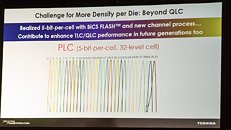Raevenlord
News Editor
- Joined
- Aug 12, 2016
- Messages
- 3,755 (1.18/day)
- Location
- Portugal
| System Name | The Ryzening |
|---|---|
| Processor | AMD Ryzen 9 5900X |
| Motherboard | MSI X570 MAG TOMAHAWK |
| Cooling | Lian Li Galahad 360mm AIO |
| Memory | 32 GB G.Skill Trident Z F4-3733 (4x 8 GB) |
| Video Card(s) | Gigabyte RTX 3070 Ti |
| Storage | Boot: Transcend MTE220S 2TB, Kintson A2000 1TB, Seagate Firewolf Pro 14 TB |
| Display(s) | Acer Nitro VG270UP (1440p 144 Hz IPS) |
| Case | Lian Li O11DX Dynamic White |
| Audio Device(s) | iFi Audio Zen DAC |
| Power Supply | Seasonic Focus+ 750 W |
| Mouse | Cooler Master Masterkeys Lite L |
| Keyboard | Cooler Master Masterkeys Lite L |
| Software | Windows 10 x64 |
Toshiba at the Flash Memory Summit announced they've managed to develop a 5-Bit-per-Cell memory solution Based on its BiCS 4 flash memory technologies, the feat was achieved using a modified module of Quad-Level Cell (QLC) memory. This shows the technology is not only feasible, but has room for improvement, since an adapted QLC technology will always be inferior to a natively-developed, Penta-Level Cell (PLC) solution.
To achieve this ability to store one extra bit of information per cell (compared to QLC), a new level of voltage refinement is required: the cell has to be able to change its state according to one of 32 voltage states, which, in turn, have to be read out correctly by the flash memory controller. This reduces the cell's performance and endurance (as does any increase in the number of bits per cell), and will require a number of solutions to mitigate and compensate for this reduced performance. However, density has become an increasing concern from manufacturers, hence the continued development of deeper, more variable voltage states that allow for even more information to be stored in the same silicon area. Higher density means cheaper solutions, but density increased in such a way has known trade-offs that have been much talked about ever since the transition from Single-Level Cell (SLC) up to the (nowadays ubiquitous) QLC.

View at TechPowerUp Main Site
To achieve this ability to store one extra bit of information per cell (compared to QLC), a new level of voltage refinement is required: the cell has to be able to change its state according to one of 32 voltage states, which, in turn, have to be read out correctly by the flash memory controller. This reduces the cell's performance and endurance (as does any increase in the number of bits per cell), and will require a number of solutions to mitigate and compensate for this reduced performance. However, density has become an increasing concern from manufacturers, hence the continued development of deeper, more variable voltage states that allow for even more information to be stored in the same silicon area. Higher density means cheaper solutions, but density increased in such a way has known trade-offs that have been much talked about ever since the transition from Single-Level Cell (SLC) up to the (nowadays ubiquitous) QLC.

View at TechPowerUp Main Site





